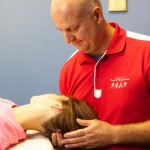Our Vestibular Program

The goal of physical therapy for vertigo and other vestibular disorders is to have the patient comfortable moving their head and body to reintegrate the vestibular system and to prevent any unnecessary falls due to their symptoms. Walter has made a name for himself in the Corpus Christi area for treatment of vertigo and other dizziness, balance, and vestibular disorders.
Our trained physical therapists use Vestibular Rehab Training to identify impairments, functional limitations, and disabilities during their program. Once the conditions are identified, the physical therapist develops a specialized plan of care that will help focus on improving these deficits.
Here at Shull Physical Therapy, we do this in a number of ways: virtual reality training using the Oculus Go, balance training using a Wii, or more conventional treatment methods such as Epley maneuvers, gaze stabilization exercises, and balance exercises, just to name a few.
Who can Benefit from Vestibular Rehabilitation?
Vestibular rehabilitation is for patients diagnosed with dizziness, imbalance, vertigo, frequent falls, Meniere’s disease, benign paroxysmal positional vertigo (BPPV), neck related dizziness or migraines.
Some examples may include: lightheadedness, vertigo (spinning), wooziness (swimming feeling in head), imbalance (unsteadiness), and syncope (the feeling of passing out). These symptoms can last in duration from seconds to days and may also vary in frequency from daily to intermittently.
Do You Have Vertigo?
Some types of vertigo come from the inner ear and some from the brain. Sometimes vertigo can be a symptom of some other disorder or condition. You will need a thorough evaluation by our physical therapist to determine the origin of your symptoms so we can develop the best treatment plan to facilitate your recovery. BPPV is the most common cause of true vertigo and dizziness. This can often be treated with an Epley Maneuver in 1 to 3 visits.
One of the first questions we ask helps determine whether you have ‘true vertigo’. When we discuss vertigo, we ask: do you see things moving or spinning in front of you? Or do you feel yourself spinning in respect to the room? This may also be an internal sense of spinning. Does the spinning room sensation last seconds or hours? We also want to know how long the true vertigo lasts, as this is important in diagnosing what is causing your problems.
